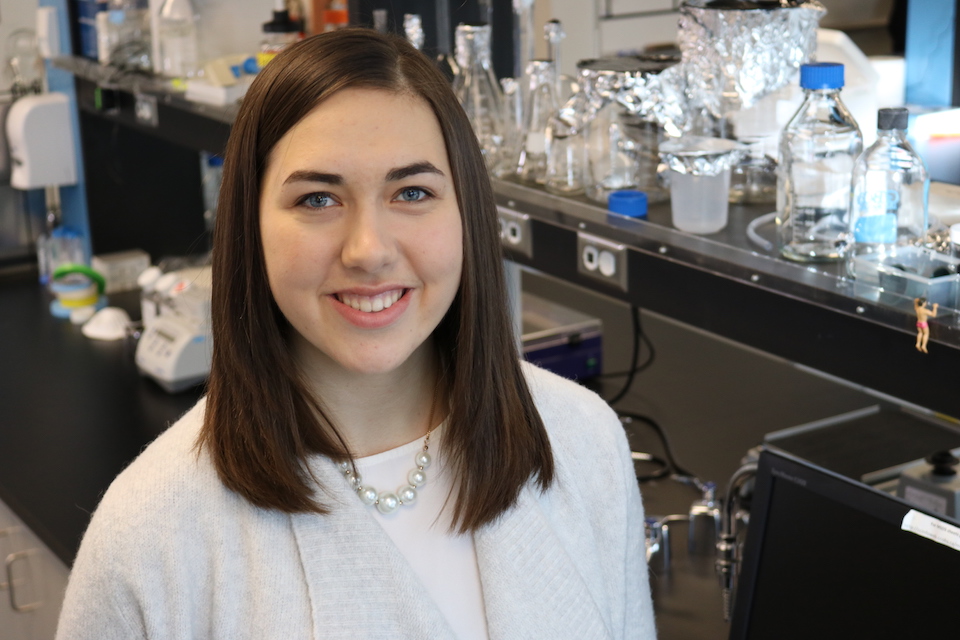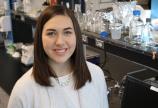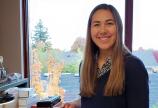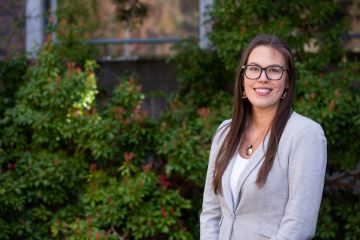Biomedical engineer thrives on fast pace of changing technology
Science, Medical Sciences, Engineering
- Anne Tolson

Even before she officially graduates in November, Brianna Carrels is already doing what she loves—working at a small, fast-paced start-up that’s developing a medical device designed to improve patient care.
Last summer, while completing her final year in UVic’s biomedical engineering program, Carrels was involved in the inception of a medical device start-up while also working part time for another med-tech company. She was hired by the CEO of the start-up for both business development and project management.
“I like being in a small start-up because although I still get to be a part of the R&D and involved in the technical aspects, I also have my hands in developing a business from scratch and learning the regulatory side of it—and I absolutely love that,” says Carrels, who switched from part-time to full-time work at GuideStar Medical Devices in September.
“One of the reasons I want to stay in biotech is that there are so many great advances happening every day and all those advances are working towards patient health and bettering the care we give people,” she adds. “That’s something I can fully get behind and passionate about.”
Medical device start-up
GuideStar, which incorporated in May, is developing a device designed to reduce the number of complications associated with epidurals—injections of anesthesia that may be given to people requiring hip or knee surgery, for example, or to women in labour.
Carrels says complications arise in about one per cent of epidurals, where doctors accidently puncture the membrane around the spinal column. Since millions of epidurals are performed in North America each year, that seemingly small percentage actually means a large number of patients suffer the debilitating effects of an epidural gone wrong, such as a severe headache that lasts for many days.
“What our device aims to do is increase the efficiency of the doctor hitting the epidural space and going no further, not puncturing the membrane, so that it’s a lot safer for the patient.”
Carrels, who is originally from Lethbridge, chose UVic both for its biomedical engineering program and its women’s varsity golf team. During her time in university, juggling the two areas proved exciting and beneficial.
I loved being able to travel and the competitiveness of being on a varsity team. It also helped to keep me sharp and get my time management and priorities straight. I honestly think it’s paid off a thousand times over now that I’m in a career and juggling so many different projects.
— Biomedical engineer graduate, Brianna Carrels
Important co-op experiences
Carrel says UVic’s co-op program also helped hone her skills and determine her career path. She experienced four diverse environments during her work terms, including: a local pharmaceutical company; the Canadian Centre for Behavioural Neuroscience; a university lab in her hometown; and the BC Children’s Hospital Research Institute, where she helped develop a method for detecting Type 1 diabetes in children.
“Every co–op I had narrowed it down to the kind of career I wanted to go into. By the fourth one, I knew what I wanted to do,” says Carrels.
In 2017, UVic named Carrels one of only three Co-op Students of the Year. And, by the time she completed her degree, Carrels had developed an extensive and diverse network that includes many senior-level professionals and professors—in sectors including biotech, research and the pharmaceutical industry.
“It really cast the net wide, so now that I’m in the workforce, if something comes up, there’s often someone I know I can reach out to and talk to for advice,” she says.
Over the longer term, Carrels can see herself pursuing another degree, perhaps in law or business, areas that would allow her to remain in the biotech or tech industry. In the meantime, she’s very happy to be working in the demanding, exciting world of a biotech start-up.
“I’d like to stay in biotech, I love how fast-paced it is,” she says. “Whether that’s on the R&D or business side, whatever my next step is, an engineering degree has set me up beautifully.”
Photos
In this story
Keywords: convocation, graduate, biomedical
People: Brianna Carrels
Publication: The Ring






